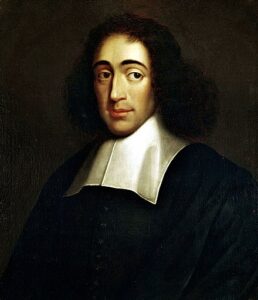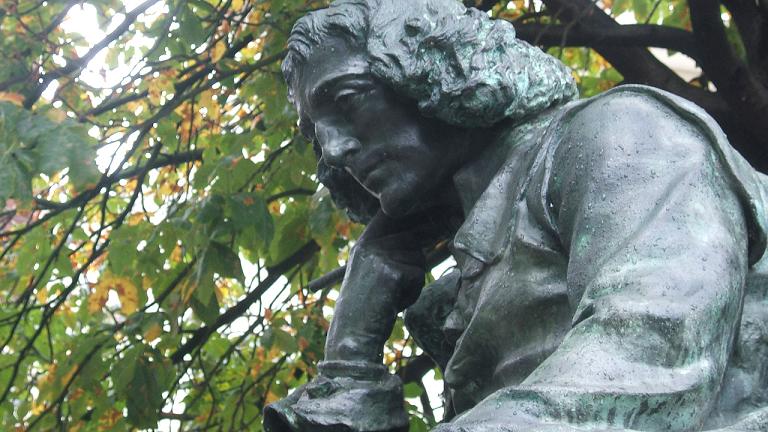
In his Theological-Political Treatise, published in 1670 and banned in 1674, Spinoza wrote: “In a free country every man is allowed to think in his own way and to say all that he thinks.” It was then the utterance of an alien from another planet. Spinoza’s liberty is demonstrated by the story of his landlord, the painter van der Speek, who asked Spinoza, “Why is it that when I lose at chess I worry and you do not, are you so indifferent to the game?” ̶ “Not at all”. – Spinoza replied. – “But whichever of us loses, one of the kings gets mate, and that pleases my republican heart.” He favored democracy: “I preferred democracy because it comes closest to the freedom that nature provides for everyone.”
Spinoza was regarded in the Amsterdam community as what the rabbis call an “illui” ̶ outstanding disciple. However, the “illui” had a critical view of the Bible and Talmud, not treating them as sacred books, but subjecting them to analysis. He scoffed at the Jewish chosenness and questioned the chronology of the Bible. He argued that Moses could not be the author of the Pentateuch. The books of Moses, in his judgment, were not written by one man and not for the people of one era. The rabbis tried to change his mind, questioned him, and gave him a month to think.
The men, who could not be induced by an autodafé to give up their convictions, hoped to induce Spinoza to do so, first by threats, then by bribery. He was offered an annual pension of a thousand florins to keep up his rites and attend the synagogue. The philosopher refused. An assassin was sent to him, who failed. On July 27, 1656, Spinoza was excommunicated from the synagogue and forced to leave Amsterdam. Despite the boycott, Spinoza wrote in his Theological-Political Treatise: “I am quite prepared to believe that the day will come when, at the proper moment, considering that human affairs are subject to change, they [the Jews] will again establish their state.”
After the publication of his Theological-Political Treatise, Spinoza was hated by theologians of all Christian directions. In 1685 the French Protestant mystic Pierre Poirier wrote: “Spinoza, having become from a Jew a Christian (he never was. – A. G.), from a Christian a deist, and from a deist an atheist, finally turned into an obscurantist and the instrument of the devil. His danger to believers is aggravated by the fact that Spinoza nowhere in his works openly admits his atheism, but instead resorts to the name of God, which he interprets as essentially a pile of finite things, bodily and spiritual.”
In Spinoza’s views, theologians were disgusted by his philosophy of pantheism: God is the immanent cause of things, not an externally acting creator; the creator is identical with his creation; God is not an otherworldly creator, he lives in every soul. People are convinced that eyes were created to see, plants and animals for food, the Sun for light. They know that these means are found, not prepared by themselves, and so they believe that there is someone who has prepared these things. They cannot think that things have made themselves so. Spinoza was against the idea that God created man in his own image. He believed that man created God in his own image, and he was against prayer to a primitive humanoid God. Einstein wrote: “I believe in Spinoza’s God, who manifests himself in the harmony of all that exists, but not in a God who occupies himself with the fate and deeds of men.”
According to Spinoza, everything in the world is governed by logical necessity. So evil is inevitable, as is good. That is why the church treated him as one of the worst sinners that ever existed.
Spinoza lived without seeking approval. German philosopher and mathematician Leibniz, sought to be popular with those in power. He was orthodox, faithful to the Christian religion, and maintained that a world governed by kings and the church was the best possible world. He acquired the nobleman’s prefix “von” and became the subject of ridicule by Swift in Gulliver’s Adventures and by Voltaire in Candide. Admiring Spinoza, Leibniz joined in his harassment. Leibniz was vain, a quality Spinoza lacked. Leibniz was constantly looking for signs of distinction. Spinoza rebelled against the erection of monuments to great men. Leibniz called Spinoza’s doctrine, which terrified the churchmen, dangerous and harmful. Leibniz seems to have been the only philosopher in history to have had two philosophies. One, praising those in power, shallow and fantastical, was known to all. The other, profound, similar to Spinoza’s teachings and based on mathematical logic, was known and understood by few.
Spinoza was not interested in money. On March 30, 1654, his father died. His father’s fortune became the subject of a lawsuit between Spinoza and his sisters. Spinoza litigated at length, and when he won the case, he voluntarily ceded the capital to his sisters. When asked why he sued, he replied, “In order to see for myself whether justice and fairness still exist in Holland. I don’t want riches, I have very different goals.”
Spinoza’s separation from the Jewish community required him to find a livelihood occupation. He did not accept gifts from patrons of the arts. Spinoza, following the Talmudic rule prescribing that scholars learn a trade, studied lens grinding.
In 1673 Spinoza received an invitation to take a professorship of philosophy at Heidelberg University. The offer meant prosperity and the opportunity to do what he loved without the risk of dying of tuberculosis due to inhalation of glass dust from the processed lenses. The philosopher did not accept the offer, for “I do not know to what limits the freedom of philosophizing granted to me should lie.” Among Spinoza’s friends were wealthy men who begged him to accept their material help and leave the harmful trade. Spinoza refused. His pupil and friend Simon de Vries begged him to accept two thousand florins. The philosopher refused. He said that such a large sum would distract him from practicing philosophy. Before his death, Simon wanted to bequeath all his fortune to Spinoza, but the latter persuaded him to make a will in favor of his rightful heir, his brother. He believed that it was possible to maintain spiritual freedom and independence by leading a life of work, full of hardship and need.
Spinoza’s indifference to money, his independence and spiritual fortitude are demonstrated by an episode in 1673 during the war with France and England. The philosopher received an invitation from Utrecht, where the general staff of the French was located, to meet with their commander-in-chief, Prince Conde. The prince offered him to dedicate a work to Louis XIV in return for a pension for life. The philosopher refused. But a mob of Dutchmen suspected him of spying for France. Calls for the murder of Spinoza began. Van der Speek, the landlord, feared that the mob would smash up his house. The philosopher reassured: “At the slightest noise of the mob at your door, I myself will go to meet it. […] I am an honest republican and have never thought of anything but the good and glory of my country.” The crowd was dissuaded from killing the “dangerous” man, citing his serious illness. Frail and sickly, Spinoza suffered from tuberculosis, aggravated by the work of grinding lenses. Those around him did not notice his dangerous condition only because of the strength of his spirit.
Colerus, Spinoza’s first biographer, noted, “No one saw him either much saddened or particularly cheerful. He had a wonderful way of ruling over his passions.” Spinoza was a simple, humble man, devoid of ambition and intent on freeing men from the tyranny of fear. In the Ethics he wrote: “The free man thinks of nothing so little as death, and his wisdom consists in thinking not of death, but of life.” He believed that man should fight disease with all his strength, but avoid the terror of imminent death and anxiety over illness by directing his thoughts to other matters. On the last day of his life he was calm, not exalted like Socrates in Plato’s Phaedon, but talked to his interlocutor about matters of interest to him as he would have done on an ordinary day.
Secular Jews define their Jewishness in terms of nation. In Spinoza’s time, Jews had only a religious identity. Spinoza may have been the first person who did not identify himself with the formal church or synagogue. During his lifetime few understood what liberal thought was and were not aware that it could be more important than ideology. Spinoza was the first non-religious Jew. Jews by nationality who do not obey the precepts of religion were “descended” from the Dutch philosopher. Spinoza was a cosmopolitan who professed, as Einstein put it, “a cosmic religion of the harmony of being.”
Spinoza did not accept religions because of human analogies–the Creator, the First Cause, Scripture written in the language of man. He denied miracles. All religions seemed to him to be the invention of several generations of fake ideologues. He turned the biblical doctrine of the chosen people into the concept of a people who chose God. For him, God is an idea, not suffering flesh and shed blood. Spinoza’s God does not produce human-like and human-understandable actions. Spinoza broke with anthropomorphic religion. He was against human crime and God’s punishment. He considered it impossible to create morality on the basis of fear of the deity.
Spinoza was apparently the first secular thinker. He believed that the church should be subordinate to the state. His spiritual self-definition was universal, containing the ideas of Judaism to the extent necessary for a value-based understanding of free man. He was opposed to extending the theocracy of biblical times to the life of the modern community.
Well versed in the history of the Marranos, Spinoza was aware of the spiritual power of the Jewish people and its role in bringing people who had been Catholics for decades back into Jewry. The Marranos were Jews not by religion but by nationality. The ability of the Jews as a nation to survive without the Temple amazed Spinoza and was the source of his prediction of the revival of the Jewish state. He saw that the hostility to the Marranos stemmed not from opposition to the Jewish religion, but from opposition to the very existence of the Jews. The prediction of the revival of the Jewish state in the mouth of a non-religious freethinker betrays the strength of his ties with the people of whom he remained a son.
*
Alex Gordon is a native of Kiev, Ukraine, and graduate of the Kiev State University and Haifa Technion (Doctor of Science, 1984). Immigrated to Israel in 1979. Full Professor (Emeritus) of Physics in the Faculty of Natural Sciences at the University of Haifa and at Oranim, the Academic College of Education.
Republished from San Diego Jewish World


























